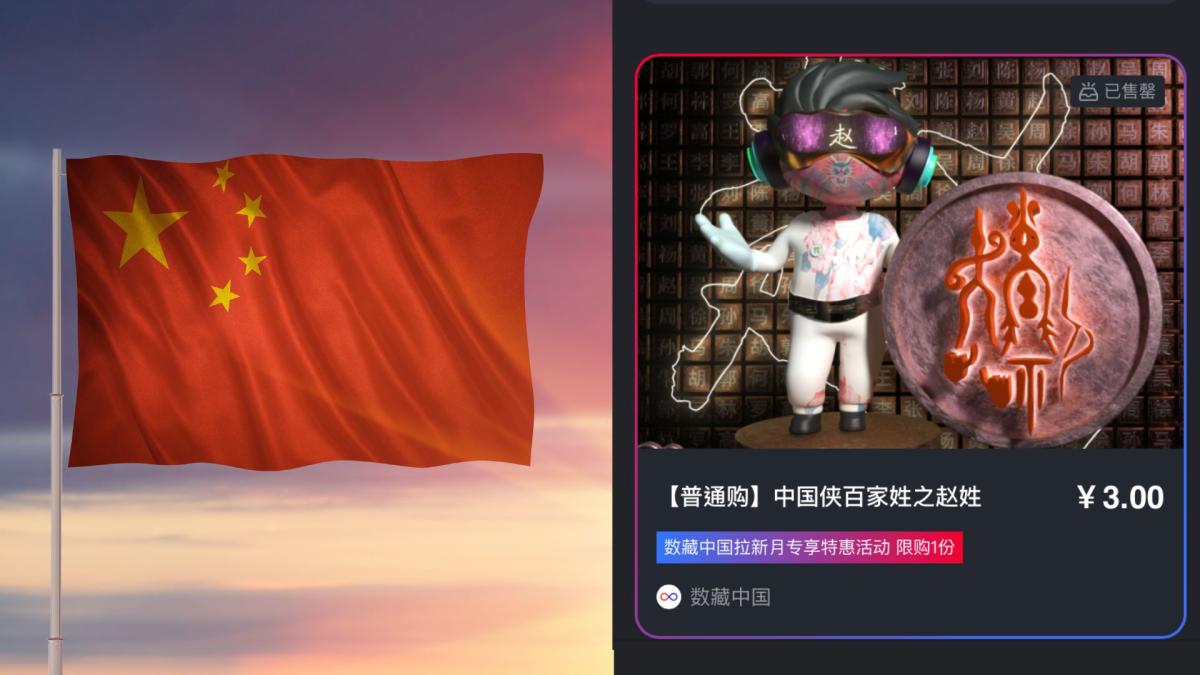Non-fungible token (NFT) platforms in China are expanding into Hong Kong to offset compliance risk for an industry that remains in a legal gray area on the mainland. It helps that the city has thrown out a welcome mat for digital asset industries.
ShucangCN, an NFT platform that launched in January 2022 in China to quickly become one of the largest players, has set up NFT China Ltd., a decision its chief executive officer said he made after the territory released crypto-friendly policy documents in October.
“We’re in the process of launching a simple NFT platform in Hong Kong in about two weeks that can facilitate NFT airdrops,” Pengfei Wang, CEO of ShucangCN, told Forkast in a phone interview on Thursday. Sales and trading features will follow when the team sets up payment routes, he said.
Yifan He, chief of Red Date Technology, the developer of the state-backed blockchain infrastructure Blockchain-based Service Network, said in an interview that mainland clients who built NFT platforms on BSN plan moves to Hong Kong, and “they’re discussing with our Hong Kong team to build their platforms there.”
China banned cryptocurrency transactions in 2021, but Hong Kong in contrast has set up a new licensing regime that may eventually extend to retail cryptocurrency trading. Current regulations in Hong Kong, a special administrative region of China, allow only institutions and professional investors with portfolios of US$1 million or more to trade digital assets.
Although Chinese regulators have yet to spell out hard and fast rules for NFTs, state media have attacked “speculative behavior” in the sector. But that hasn’t stopped China’s consumers from buying and trading digital collectibles, and many platforms, including ShucangCN, offer such services.
In 2022, ShucangCN had about 30 million yuan (US$4.5 million) in revenue with a gross profit margin ratio of 30%, said CEO Wang. In June, it launched its main NFT trading platform Huashu Wenchuang in collaboration with Chinese cultural equity exchange Huaren Exchange Center of Culture Property, a platform that typically trades property rights and ownership of traditional artworks, and saw tens of millions of yuan of NFT trades through the end of last year, according to Wang.
Tony Fu, head of ShucangCN’s Hong Kong entity, told Forkast that secondary trading remains in legal limbo on the mainland, which could bring compliance issues in the future, hence the plan “to set up a secondary trading platform in Hong Kong.”
He at Red Date said Chinese regulators are particularly strict about businesses that come with unauthorized capital pools, as the practice often carries high risks for investors. But to earn commissions, NFT trading platforms process transactions through capital pools, He added.
“All cultural equity exchanges that operate secondary trading are all against the law, as they don’t have the licenses to run secondary market businesses with capital pools involved,” He said.
ShucangCN’s future Hong Kong platform will allow mainland users to transfer their “digital collectibles” – the term for NFTs on the mainland – to the company’s Hong Kong marketplace and trade there, Wang said.
“Once our secondary trading platform in Hong Kong is set up, users can choose to mint and trade directly in Hong Kong, or they can mint on the mainland platform and trade in Hong Kong,” Wang said.
BSN would play an essential role here, He of Red Date said.
Chinese mainland platforms that mint digital collectibles with BSN-DDC, a domestic BSN network, can transfer the NFTs to BSN’s overseas network Spartan or Ethereum and even trade on OpenSea, according to He.
“There is no [legal] issue transferring NFTs out of the mainland, as there’s no personal information attached to them. But you cannot transfer any income from trading back to the mainland. That would be illegal and considered money laundering,” He said.
The explosion in NFT interest took off in China in 2021 and reached a peak around May and June of last year, before slowing down significantly and bottoming in October, according to Wang.
Wang said on the mainland, the company will focus on exploring the utilities of digital collectibles.
“Until now, many people bought NFTs for collecting or trading purpose. We’re hoping to explore more possibilities,” Wang said. He added that ShucangCN is collaborating with a virtual reality company to create digital collectibles linked to assets or buildings in their virtual world.
The Hong Kong entity has submitted an application to be part of the incubation program of Cyberport, a technology business park backed by the Hong Kong government.
The ShucangCN and NFT China officials said they aim to generate a combined 50 million yuan in revenue for 2023, compared to 2022’s 30 million yuan.
While doubts persist over the legitimacy of NFT trading in China, state-owned entities China Technology Exchange and Art Exhibition China, along with blockchain developer Huaban Digital Copyright Service Center, on Jan. 1 this year launched a digital collectibles trading platform “China Digital Asset Trading Platform”, according to state media reports.
Its website, however, only said the platform is “coming soon” and that it is accepting collaboration applications.
“It’s a bold move to publicly market itself as a secondary trading platform,” He of Red Date said of the new entrant, adding that he had warned the platforms built on BSN not to engage in secondary trading.
Despite regulatory uncertainty, Wang at ShucangCN said there is still a business to be made on the mainland.
“Trading platforms in China put speculation prevention as first priority,” Wang said, adding that platforms such as iBox have operated for quite a long time and avoided strict government restrictions.
“So far, it seems the risks are controllable,” Wang said.
Ripple's SVP of Global Customer Success, and Managing Director for APAC and MENA, Brooks Entwistle, discusses the company's plans in 2023, emphasizing its growth outside of the U.S. Plus, he shares Ripple's approach to partnering with central banks around the world to develop CBDCs.
Much depends on how quickly the country’s ’tsunami’ of COVID infections lasts, and whether Beijing’s unpredictable virus-control policies hamper or foster growth, analysts say
Developers are mainly focusing on alternative ecosystems to Bitcoin and Ethereum, helping them grow faster, the VC firm said in a report.
The popular NFT marketplace has introduced a tool that helps creators build their own collection-based storefronts for free.
Nexo has sued the Cayman Islands Monetary Authority to overturn its rejection of Nexo's application to register as a virtual asset services provider.
Founders of Three Arrows Capital, a crypto hedge fund whose bankruptcy in June resulted in potentially billions of losses for investors and creditors, are seeking to raise up to $25 million for their new business.
The crypto-climate coalition is trying to come up with interoperability principles and business cases.
Netflix has laid out its film programming for 2023, with new features from David Fincher (The Killer), Zack Snyder (Rebel Moon), David Yates (Pain Hustlers), Sam Esmail (Leave The World Behind). With 49 films set for release this year, you can expect almost one major film a week from the production company/streamer.
Rob Massey, Deloitte Tax LLP Partner, Global & US Tax Blockchain & Digital Assets Leader, joins "First Mover" at the annual World Economic Forum in Davos, Switzerland, to discuss restoring trust in the crypto and blockchain industry following a year of contagion. Plus, his response to Bank of America's statement that digital currencies are the natural evolution of money and payments. And, the challenges posed by current tax policies in the US.
Shares of Tencent Holdings, the world's largest gaming company, and smaller rival NetEase Inc rose on Wednesday after China's video games regulator granted the first gaming licences in 2023, further easing an industry crackdown. Tencent's shares rose as much as 1.7% in early trade before paring gains, while NetEase's stock jumped as much as 5.8% to its highest in more than four months. The granting of publishing licences to 88 online games on Tuesday is the latest sign that a regulatory clampdown that began in August 2021 and took a heavy toll on the world's largest gaming market is ending.
Bob Prince, co-chief investment officer at Bridgewater Associates, says it is unlikely that the Federal Reserve's policy tightening will lead to a "painless" return to a US economy similar to the last decade. "What's actually happening is more like the 70s, more like the boom-bust cycle. And so it's unlikely that we have kind of a one and done painless tightening," he says at the World Economic Forum's annual meeting in Davos, Switzerland on "Bloomberg Markets." Follow Bloomberg for business news & analysis, up-to-the-minute market data, features, profiles and more: http://www.bloomberg.com Connect with us on… Twitter: https://twitter.com/business Facebook: https://www.facebook.com/bloombergbusiness/ Instagram: https://www.instagram.com/quicktake/?hl=en
The bailout by the Federal Home Loan Bank has critics questioning whether the government-backed enterprise has lost its way.
Clean tech and green energy sectors are on the cusp of a strong multiyear growth run. That's the opinion of Morgan Stanley's 5-star analyst Stephen Byrd who notes that political will is likely to support the practical benefits of clean and renewable energy to create a favorable environment for ‘clean and green’ tech over the next few years. Outlining his view, Byrd writes: “We believe current valuations do not reflect the long-term robust growth and margin improvement that we see as a result of
Kinder Morgan (NYSE: KMI) ended 2022 on a strong note. Its distributable cash flow was up by a double-digit percentage, fueled partly by improving energy market conditions. As a result, its full-year earnings were also up by a double-digit percentage after adjusting for the positive impact of winter storms in 2021.
The black sheep among big banks this earnings season was definitely Goldman Sachs (NYSE: GS). The Wall Street bank saw its earnings plunge last quarter, as its core investment-banking business ground to a halt amid historically weak numbers of initial public offerings and mergers. In order to diversify away from the volatile investment banking and trading arms, Goldman has tried to cultivate its own consumer banking division under its Marcus brand.
Tilray Brands (NASDAQ: TLRY) and other Canadian cannabis companies have struggled to generate growth, as competition has been rising over the years and there hasn't been enough demand to go around. On Jan. 9, Tilray released its second-quarter earnings numbers, which failed to impress. It only confirms what investors should be getting ready for: the moment that management declares its overly optimistic and ambitious revenue target of $4 billion by 2024 is not attainable.
Roblox (NYSE: RBLX) updated investors with essential company metrics. Investors liked what they saw, and Roblox stock jumped double-digits on the news. *Stock prices used were the afternoon prices of Jan.
Marijuana stocks had a difficult year. With the broader market falling, cannabis stocks took a bigger hit in 2022 due to the lack of progress toward federal legalization in the U.S. According to MarketsandMarkets, this industry will be worth $83 billion by 2027 if it grows at a compounded annual growth rate (CAGR) of 24.3%.
Here is how Ardelyx (ARDX) and Agile Therapeutics (AGRX) have performed compared to their sector so far this year.
Since the Great Recession, Bank of America (NYSE: BAC), one of the largest commercial lenders in the country, has been going about a strategy that CEO Brian Moynihan calls "responsible growth." This refers to growing the balance sheet with disciplined loan underwriting so the bank can ride out any economic downturns. In the fourth quarter, Bank of America reported a big step up in commercial net charge-offs, which represents debt unlikely to be collected and a good indicator of actual loan losses.


